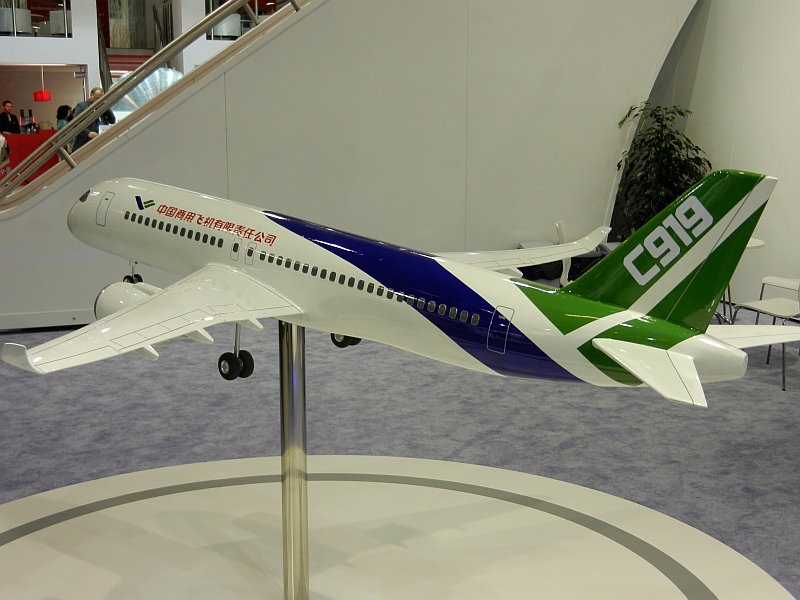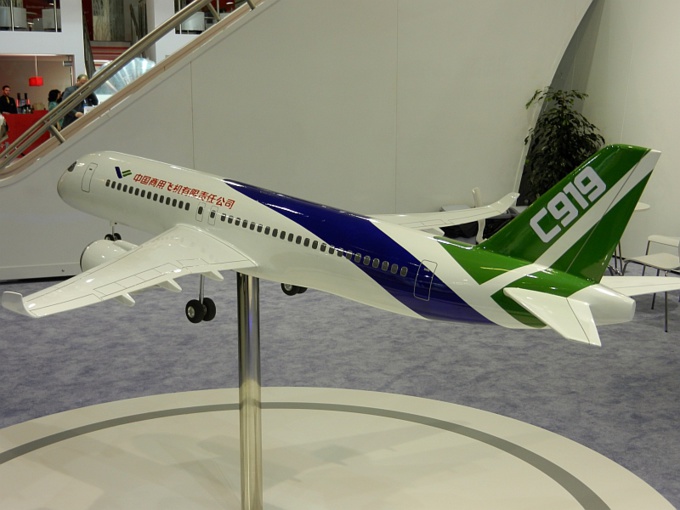However, you can lift an airplane into the air, but may not be able to withstand tough competition in the civil aviation market. Given reports that China has allocated $ 317 billion to finance projects using new production technologies, their profitability appears to be far from the top of the list of priorities.
China has been dreaming of becoming an independent aviation power since the 1970s. In reality, however, the country turned out to be an assembly site, including for some aircraft (Airbus, for example, started assembling A320 aircraft in China in 2008). Yet, creation of the narrow-bodied C919 from scratch is China's first major step in destruction of the duopoly of Boeing and Airbus.
Skeptics regard C919 as an example of unreasonable waste inherent to the program for the development of national production. Although the country’s own aircraft demonstrates China's progress in the aerospace industry, three-quarters of its technology is foreign, and it's not even close to the level of new Boeing and Airbus aircraft, says Richard Aboulafia of Teal Group consulting group. According to most experts, the technologies used in C919 have become obsolete 10-20 years ago, which is why the newly assembled aircraft’s fuel efficiency is already inferior to the modern competitors.
In addition, it should be understood that production capacity of Boeing and Airbus is quite enough to cover the needs of all world airlines. Therefore, in order to enter this monopolized market, one must have a really high-quality product and a powerful financial lever. Obviously, China has enough money to pour into an aircraft corporation. Beijing can afford to finance deals on very attractive terms, and so price for the Chinese aircraft will not be very high.
However, before the real struggle is still far away. The Chinese liner has just started flight tests, and, as the developer claims, they will be lasting for three years.
Experience of Boeing and Airbus shows that in some cases the tests may take less time, if there are no dramatic problems. In general, however, the time frame for the new program looks realistic. You don’t need to rush in such cases. Moreover, both Americans and Europeans have had hiccups at the stage of testing. For example, the Boeing 787 Dreamliner had problems with the batteries during the tests, and so had to prolong the testing period.
Yet, Comac has a serious advantage. Three major state-owned airlines have already agreed to buy these C919. However, it is not known whether they will make new orders after the mass production of C919 begins in the early 2020s.
Beijing's ambitions are relatively modest in aviation. According to the "Made in China" initiative, by 2025 only 10% of passenger aircraft in the country should be produced locally. For comparison, the share of Chinese electric vehicles during this time should reach 80%, and industrial robots - 70%. Proceeding from this, analysts reckon that China will need to produce 20-30 aircraft by 2025. However, even this can be a difficult task. Comac plans to produce 2,300 C919 aircraft within 20 years, but Teal Group’s experts doubt that the company will be able to sell more than a few dozen units against the background of severe competition with Boeing and Airbus.
Beijing will consider a success the very entrance in the industry, if we regard the C919 as the first step in a long-term project to combat the duopoly of Boeing and Airbus, says Jost Wübbeke of the Berlin Mercator Institute for China Studies. Also, he points out, the "Made in China" program is only wishes of the government, which in fact does not expect to achieve a breakthrough in all 10 target industries. According to Wübbeke, it is likely that Beijing wants to achieve success in two or three sectors, such as the production of electro cars and semiconductors, and is ready to suffer heavy losses for programs such as the C919, even if they bring some results. "The West often underestimates the Chinese approach to give orders from above", says Wübbeke. "In this regard, resources are spent in vain, but it brings results anyway".
source: wsj.com
China has been dreaming of becoming an independent aviation power since the 1970s. In reality, however, the country turned out to be an assembly site, including for some aircraft (Airbus, for example, started assembling A320 aircraft in China in 2008). Yet, creation of the narrow-bodied C919 from scratch is China's first major step in destruction of the duopoly of Boeing and Airbus.
Skeptics regard C919 as an example of unreasonable waste inherent to the program for the development of national production. Although the country’s own aircraft demonstrates China's progress in the aerospace industry, three-quarters of its technology is foreign, and it's not even close to the level of new Boeing and Airbus aircraft, says Richard Aboulafia of Teal Group consulting group. According to most experts, the technologies used in C919 have become obsolete 10-20 years ago, which is why the newly assembled aircraft’s fuel efficiency is already inferior to the modern competitors.
In addition, it should be understood that production capacity of Boeing and Airbus is quite enough to cover the needs of all world airlines. Therefore, in order to enter this monopolized market, one must have a really high-quality product and a powerful financial lever. Obviously, China has enough money to pour into an aircraft corporation. Beijing can afford to finance deals on very attractive terms, and so price for the Chinese aircraft will not be very high.
However, before the real struggle is still far away. The Chinese liner has just started flight tests, and, as the developer claims, they will be lasting for three years.
Experience of Boeing and Airbus shows that in some cases the tests may take less time, if there are no dramatic problems. In general, however, the time frame for the new program looks realistic. You don’t need to rush in such cases. Moreover, both Americans and Europeans have had hiccups at the stage of testing. For example, the Boeing 787 Dreamliner had problems with the batteries during the tests, and so had to prolong the testing period.
Yet, Comac has a serious advantage. Three major state-owned airlines have already agreed to buy these C919. However, it is not known whether they will make new orders after the mass production of C919 begins in the early 2020s.
Beijing's ambitions are relatively modest in aviation. According to the "Made in China" initiative, by 2025 only 10% of passenger aircraft in the country should be produced locally. For comparison, the share of Chinese electric vehicles during this time should reach 80%, and industrial robots - 70%. Proceeding from this, analysts reckon that China will need to produce 20-30 aircraft by 2025. However, even this can be a difficult task. Comac plans to produce 2,300 C919 aircraft within 20 years, but Teal Group’s experts doubt that the company will be able to sell more than a few dozen units against the background of severe competition with Boeing and Airbus.
Beijing will consider a success the very entrance in the industry, if we regard the C919 as the first step in a long-term project to combat the duopoly of Boeing and Airbus, says Jost Wübbeke of the Berlin Mercator Institute for China Studies. Also, he points out, the "Made in China" program is only wishes of the government, which in fact does not expect to achieve a breakthrough in all 10 target industries. According to Wübbeke, it is likely that Beijing wants to achieve success in two or three sectors, such as the production of electro cars and semiconductors, and is ready to suffer heavy losses for programs such as the C919, even if they bring some results. "The West often underestimates the Chinese approach to give orders from above", says Wübbeke. "In this regard, resources are spent in vain, but it brings results anyway".
source: wsj.com



















